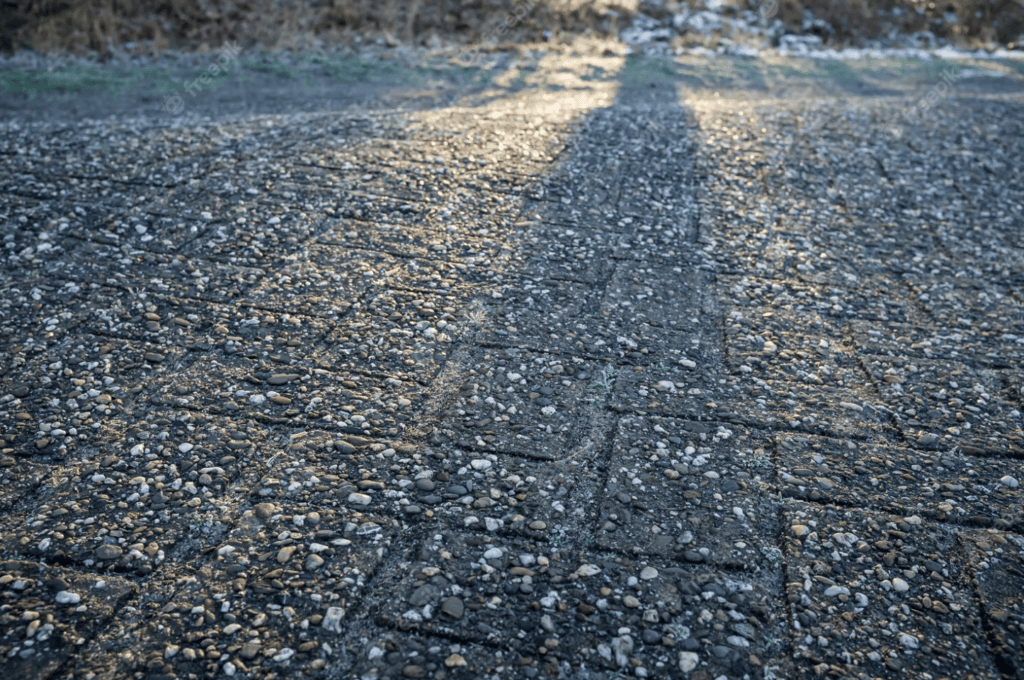
Various driveway options are available for today’s discerning property owners, including stamped asphalt driveways.
How much do stamped asphalt driveways cost? What kind of maintenance requirements do they have? How does climate affect them, and how durable are they?
In order to make an informed decision for your home or property, it is essential to have all of the facts.
What is a Stamped Asphalt Driveway?

Stamped asphalt driveways are decorative driveways created using heat, a stamping template, and a plate compactor.
Stamping templates are available in various styles and patterns and can mimic brick, cobblestones, pavers, and more.
What to Know Before Installing a Stamped Asphalt Driveway
Before you commit to a stamped asphalt driveway, you should evaluate the cost, maintenance, lifespan, and durability in order to make an informed decision.
Stamped Asphalt Driveway Cost Considerations
Stamped asphalt driveways are an affordable option when compared to poured concrete, brick, concrete pavers, and cobblestones.
A new asphalt driveway typically takes less than forty-eight hours to install and is ready for use almost immediately. Poured concrete can require substantially more labor and time and a significantly longer curing period. Brick, paver, and cobblestone driveways don’t need any drying or curing periods but can be extremely tedious to install, and can substantially increase labor costs.
The material cost of asphalt is very favorable when compared to its alternatives. Asphalt typically costs less per square foot than concrete, brick, concrete pavers, and cobblestones.
Although a brand-new stamped asphalt driveway is typically less expensive than similar alternatives, stamping your existing asphalt driveway is where the cost savings really come into play.
Stamping an existing asphalt driveway eliminates the need for new materials and substantially reduces the costly price of labor.
Maintenance Requirements
One of the most significant benefits of a stamped asphalt driveway is its minimal maintenance requirements.
Although asphalt driveways will typically last around twenty years before needing significant maintenance, if you live in a place where frost heaving is common or the asphalt is subject to extreme heat, it may require attention more frequently.
Stamped asphalt driveways that experience significant frost heaving can crack and separate, and may often require seal coating, crack filling, or resurfacing.
How Climate and Weather Affect Stamped Asphalt Driveways
Asphalt is a flexible pavement that can move with weather-related changes.
If you live in a place that experiences substantial cold and frost heaving, your stamped asphalt driveway can still be susceptible to cracks. If left unaddressed, these weather-related failures will persist and often compound.
Durability and Lifespan
Because of its rugged, flexible nature, asphalt is an incredibly durable driveway material, often lasting up to twenty years with regular maintenance.
In temperate climates, you must resurface most stamped asphalt driveways after twenty years.Seal coating may be required periodically.
Attractive Alternatives to Stamped Asphalt Driveways
While a stamped asphalt driveway may seem appealing, there are other alternatives to consider before you commit to a choice.
Concrete

Concrete is a tried-and-true, time-tested material that has been used for centuries. Concrete has battle-tested advantages, but this age-old building material also has some serious flaws.
If you live in a place that experiences frost heaving or other substantial sub-grade movement, your concrete driveway will likely crack.
Once cracked, concrete is challenging to repair and almost impossible to repair in an aesthetically pleasing way. Completely removing and replacing the damaged slabs is often the only proper solution.
Permeable Pavers
Permeable pavers are plastic, interlocking grids that are snapped into place and filled with gravel or grass.
Due to their durable, engineered structure, plastic grid permeable pavers protect the delicate root systems of grass from being crushed when driven on, and they will hold gravel firmly in place.
Unlike concrete and asphalt, which can crack and split with cold weather and movement, a gravel or grass driveway built with permeable pavers are immune from weather-related damage.
Permeable pavers require virtually no maintenance, and you can easily install them as a motivated DIYer.
Unlike impermeable surfaces like asphalt and concrete, driveways made with permeable pavers allow 100% of stormwater and runoff to return to vital groundwater supplies.
Install Durable, Beautiful, and Eco-Friendly Driveways with TRUEGRID

Are you sick and tired of paying for expensive maintenance and tedious repairs on garish concrete and asphalt driveways? Never worry about your driveway again with TRUEGRID.
TRUEGRID permeable pavers are not only engineered with best-in-class compressive strength to handle vehicles of all sizes, but are also made from 100% post-consumer recycled HDPE plastics.
Choose from TRUEGRID’s range of products to find the best paver for you and your home.
- PRO-LITE is the toughest and most economical residential grade permeable paver on the market today and is perfect for driveways, overflow parking lots, bike paths, and patios.
- PRO-PLUS is the industry’s leading commercial-grade permeable paver. Engineered with industry best strength, the PRO-PLUS easily handles parking lots, truck yards, and roadways.
- ROOT is the world’s quickest and strongest grass reinforcement. Simply lay ROOT on the grass, wet the area thoroughly, and press your ROOT pavers into the grass with a roller; no anchors required.
Visit the TRUEGRID website today for a free estimate, and see how TRUEGRID can be true to your project and true to the environment.



